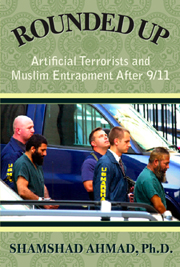Senate Hearing on Solitary Confinement
The Missing Piece
By Melva Underbakke
In June of 2012, the first ever and long over due hearing on solitary confinement was held in front of the Senate Judicial Subcommittee on the Constitution, Civil Rights and Human Rights.
Click here to watch the entire historic hearing.
Senator Dick Durbin, who chaired the session, talked about the importance of this hearing in his opening statement. He noted that the United States has the highest rate of incarceration of any country in the world, and that the United States is also a leader in the numbers of prisoners held in solitary confinement with over 80,000 people held in isolation. There is also a very high cost - about $60,000 per year per prisoner, as compared to an average of about $22,000 for other prisoners.
Solitary confinement is extremely damaging to the prisoner. In fact, UN Special Rapporteur Juan Méndez has said that any such confinement is torture and isolation for more than 15 days should be prohibited since lasting mental damage can occur after only a few days. (UN News Service, October 18, 2011 http://www.un.org/apps/news/story.asp?NewsID=40097). A number of people at the hearing testified about the horrors of solitary confinement, including Anthony Graves, who had been in isolation for 18 years on death row in Texas, and Psychology Professor Craig Haney, who has studied the effects of solitary confinement for 30 years.
In addition to the humanitarian issues, Commissioner Christopher Epps testified that reforms in Mississippi that greatly reduced the use of solitary confinement resulted in fewer incidences of violence in the prison, less recidivism and monetary savings. The aggregate of information presented during this hearing would strongly indicate that solitary confinement is inhumane, extremely damaging to prisoners, and it does not accomplish its intended goals.
While Senator Durbin did mention that African Americans and Hispanics are grossly over-represented in our prisons, no mention was made of the many Muslims in our prisons who are held in solitary confinement, not only after conviction, but also BEFORE the trial begins – often for years.
These are Muslims who have been arrested on terrorism-related charges, in a process many call pre-emptive prosecution; in other words, prosecution before a crime has take place.
The Director of the Federal Bureau of Prisons Charles Samuels stated in his report to the committee that the use of solitary confinement is justified because the government says that these prisoners are so dangerous they need severely restrictive confinement to prevent future terrorist acts.
However, most, if not all, of the Muslims charged with terrorism in the United Sates have not committed any violent acts – and they are not accused of any violence. Essentially they are charged with “thought crimes” - the government asserts that because of their ideology, they might plan acts of violence in the future. Typical charges involve “conspiring” to commit acts of violence, or providing “material support to terrorists” – support which can be merely speech.
There are many examples of preemptive prosecution of thought crimes, but the case that I am most familiar with is that of Dr. Sami Al-Arian*, formerly a tenured professor at the University of South Florida and long-time colleague and neighbor. He was indicted in 2003 on terrorism-related charges. Dr. Al-Arian was a well-respected member of the community; however, he was a vocal supporter of Palestinian rights. Prior to this indictment, he had never broken any law or committed any violence. Nonetheless, he was held in extremely harsh conditions of isolation for 2½ years BEFORE the trial started. The jury refused to convict him of terrorism, and when asked what it would have taken to render a guilty verdict, one juror replied “Evidence.”
Dr. Al-Arian’s situation is not an isolated one. There are many others accused of terrorism who were influential members of their communities but held unpopular political views: for example, Dr. Kifah Jayyousi, Dr. Abdulhaleem Ashqar, Yassin Aref, Tarek Mehanna, and Ghassan Elashi.
Other “thought criminals” are guilty of tenuous associations or they are entrapped. Syed Fahad Hashmi** is one example of “guilt by association”. Hashmi allowed a friend to store rain gear in his apartment in Great Britain for two weeks, and the friend allegedly later gave these to Al-Qaida leaders. For this, Hashmi spent 3½ years in extremely harsh solitary confinement PRE-TRIAL. A few more examples are Ehsanul “Shifa” Sadequee, Ziyad Yaghi, Tarek Shah and Youssef Megahhed. (Many other examples of PRE-TRIAL solitary confinement can be found at www.projectsalam.org).
Because of this treatment, prisoners obviously are not mentally or emotionally capable of preparing for their defense. Many of these prisoners reach a plea agreement with the government, rather than going to trial, hoping to end their isolation and reduce their sentences.
The Senate hearing included information on many affected subgroups in our population, including African-Americans, Hispanics, LGBT individuals, the mentally disabled and the mentally ill. However, the group that was glaringly left out is Muslims accused of terrorism. They clearly do not receive the due process guaranteed them by our Constitution since they are held in solitary confinement BEFORE the trial, as well as after.
Senator Durbin urged his colleagues to visit some prisons and see for themselves what is going on. I urge this Committee to also look into the situation of Muslims held in both POST- and PRE-trial solitary confinement in our prison system.
*A documentary film about this case USA vs Al-Arian by Line Halvorsen, can be viewed online at http://www.usavsalarian.com/
**For excellent coverage of Hashmi’s case, see Democracy Now, April 28, 2010. http://www.democracynow.org/2010/4/28/after_3_years_in_pretrial_solitary
